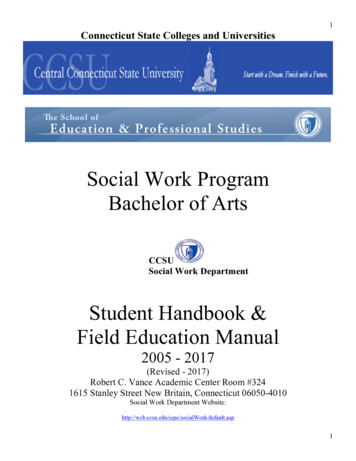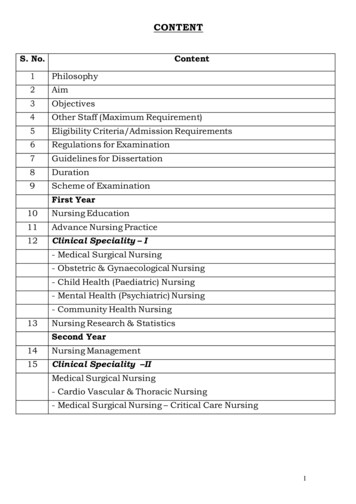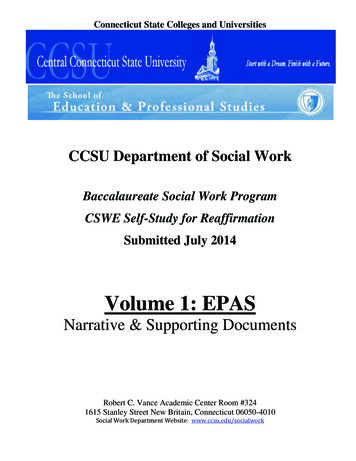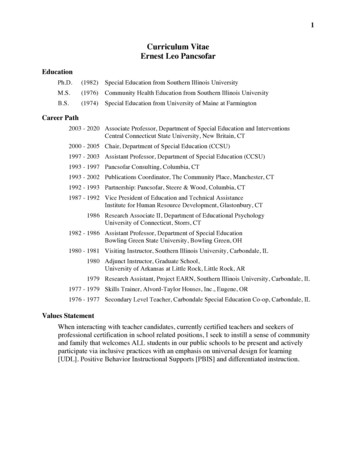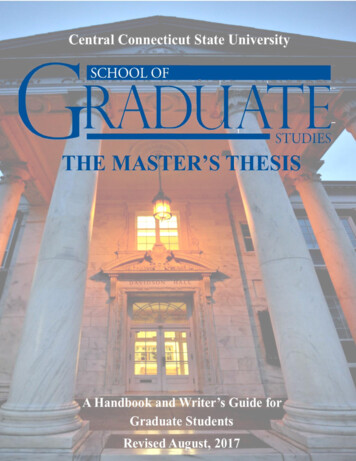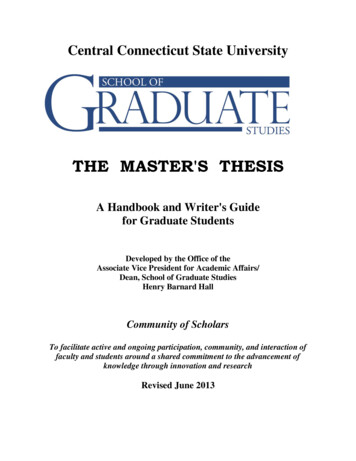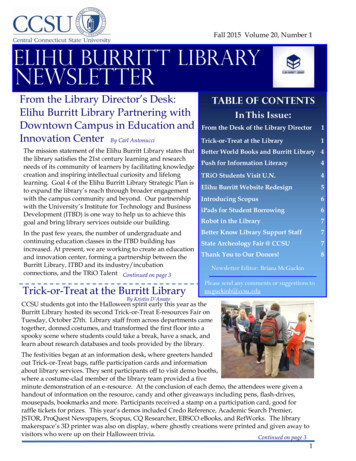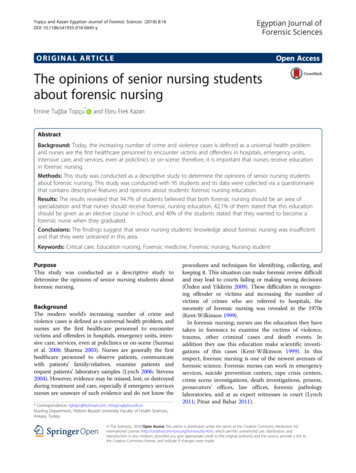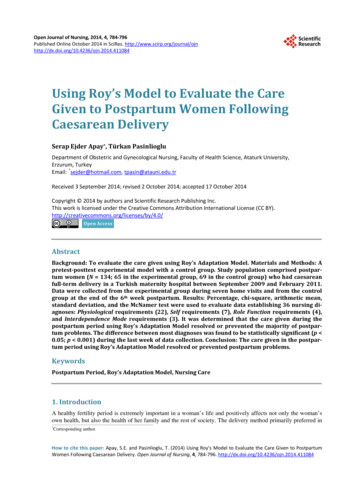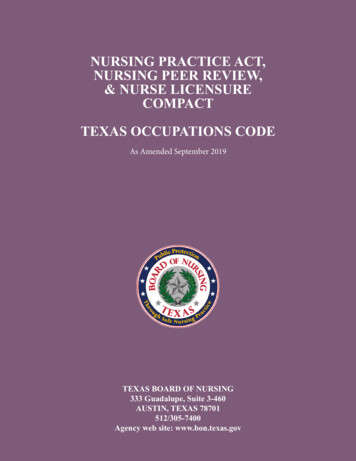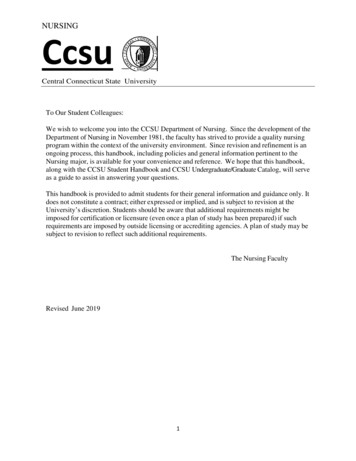
Transcription
NURSINGCcsuCentral Connecticut State UniversityTo Our Student Colleagues:We wish to welcome you into the CCSU Department of Nursing. Since the development of theDepartment of Nursing in November 1981, the faculty has strived to provide a quality nursingprogram within the context of the university environment. Since revision and refinement is anongoing process, this handbook, including policies and general information pertinent to theNursing major, is available for your convenience and reference. We hope that this handbook,along with the CCSU Student Handbook and CCSU Undergraduate/Graduate Catalog, will serveas a guide to assist in answering your questions.This handbook is provided to admit students for their general information and guidance only. Itdoes not constitute a contract; either expressed or implied, and is subject to revision at theUniversity’s discretion. Students should be aware that additional requirements might beimposed for certification or licensure (even once a plan of study has been prepared) if suchrequirements are imposed by outside licensing or accrediting agencies. A plan of study may besubject to revision to reflect such additional requirements.The Nursing FacultyRevised June 20191
NURSINGCcsuCentral Connecticut State UniversityI.CCSU Nursing ProgramsA. Mission StatementThe Nursing faculty, in accord with Central Connecticut State University, believes that,in a dynamic society, education for membership in a profession includes the development ofexpertise in a field and social awareness. In contemporary times, this social awareness includesthe development of an increasingly global perspective. The professional nurse with a liberaleducation thinks critically, provides care that is interpersonally and therapeutically competent,and makes socially significant and personally satisfying contributions to society. The ultimategoal of nursing is to assist individuals, families, and groups to achieve optimal levels of healthor wellness. A degree in nursing will empower the student to attain the highest standards ofacademic achievement, public service, and personal development. A foundational basisencompassing a liberal arts education, nursing theory, and nursing practice will provide thegraduate with the ability to have critical judgment and professional accountability in nursingpractice. Additionally, the faculty believes that self-directed inquiry and individualized studentlearning further reflect their mission to serve a wide range of citizenry with varyingcharacteristics and needs.B. OverviewThe Bachelor of Science in Nursing Program is a program in the School of Education andProfessional Studies, organized in 1981 with initial National League for Nursing accreditationawarded for an eight-year period in 1986 and reaccredited by NLN in 1994.2
NURSINGCcsuCentral Connecticut State UniversityIn 2006, the Commission on Collegiate Nursing Education accredited the undergraduateprogram (CCNE) of American Association of Colleges of Nursing (AACN) for the maximumperiod of ten (10) years. CCNE awarded the program re-accreditation in 2016 for ten (10) yearsthrough 2026. In 2019, CCNE accredited the MSN in Hospice and Palliative Care for five (5)years through 2024.The purpose and objectives of the programs flow directly from the mission statement ofCentral Connecticut State University. The purpose of the program, to prepare the student toobtain a Nursing degree and to empower the student to attain the highest standards of academicachievement, public service, and personal development reflecting Central Connecticut StateUniversity’s fundamental responsibility.As a university, Central Connecticut State University stands firm as an advocate ofliberal and humane learning and for enlightened and productive participation in a global society,based on the requirement of blending the liberal arts education with dynamic professionaleducation. In all aspects of learning, students are encouraged to read with discrimination, tothink clearly and critically, to write with accuracy and to appreciate the scientific, social andaesthetic principles and values, which have shaped our increasingly interdependent society. Atthe same time, the university strives to provide an environment that is conducive to the personaldevelopment of each student through a wide array of student activities, which foster leadership,community service, responsibility and creativity.3
NURSINGCcsuCentral Connecticut State UniversityThe Nursing faculty believes that a liberal education in the natural and behavioralscience and the humanities, with theory and practice in Nursing, form the basis for criticaljudgment and professional accountability in graduates. The belief that formal education is apreliminary to continued study and a lifetime of creative activity, is reinforced throughout thestudent’s program of study and is demonstrated by faculty through their scholarly pursuits. Thefaculty believes that self-directed inquiry and individualized student learning further reflecttheir mission to serve a wide range of citizenry with varying characteristics and needs. Thepurpose of the Department of Nursing is to provide a program of high academic excellence,based upon a strong foundation in the arts, sciences and humanities. The program is designed toprepare a professional nurse who is aware of and alert to existing and anticipated nursing andhealth care needs of individuals, families, and communities. The professional nurse will be ableto respond with relevant knowledge and skills to meet these needs in a variety of health caresettings.It is anticipated that professional nurses, as individuals and as citizens, will demonstrateresponsibility and accountability to the consumer as well as to themselves and the profession.They will be collaborative participants in the health care system. The baccalaureate programs aredesigned to serve as a foundation for graduate study and to provide an environment in whichstudents can develop their potential as individuals and as contributing members of society.The Master of Science Degree, Nursing (MSN) prepares students for a specialty focus toexpand their career options. As part of this specialty focus, students gain an advanced4
NURSINGCcsuCentral Connecticut State Universityknowledge base and skill set that is grounded in the scientific discipline and art of professionalnursing. This level of professional education is necessary to meet the needs of a complex andchanging health care system and new client demands for optimum outcomes and quality. Thedegree program is designed to foster interdisciplinary collaborative skills and independentfunctioning. Advanced education with a specialty focus provides additional skills to achieveoptimum health care for specific populations.C. Department of Nursing ValuesNursingAt all levels on the wellness continuum, the role of the nurse is to contribute to theprovision of an optimal environment to promote growth and to maximize movement toward thehighest level of wellness that the individual is able to achieve. The practice of nursing is both ascience and an art based on professional nursing standards; it achieves its goals by a processknown as caring. Caring involves therapeutic interventions based on interpersonalcommunication skills, technical competence, and the deliberate use of an intellectual process,consisting of assessing, planning, intervening, and evaluating a plan of care with the client.Nursing has both independent and interdependent functions. The independent function of thenurse is the diagnosis and treatment of responses to actual or potential health problems. Theinterdependent function of the nurse is to work with other health care providers to promote aninterdisciplinary approach to comprehensive health care.Nursing intervention varies with whether or not the client is in need of services.5
NURSINGCcsuCentral Connecticut State UniversityEmphasis is placed on prevention through health teaching, support of functional copingmechanisms, and the mobilization of support systems. When total recovery seemsimprobable, the nurse works, through rehabilitation, to return the client to this optimal levelof wellness or to support a rational and dignified death.Nurses work autonomously within a defined scope of practice and collaboratively withmembers of the healthcare team. Nursing regulations and standards are defined by theState Board of Nurse Examiners, the Scope and Standards of Practice, and the Code ofEthics for nurses guide nursing practice. Nurses are accountable to the public that theyserve.A degree in Nursing fosters self-awareness, intellectual curiosity, and personal fulfillmentand are consistent with the hallmarks of nursing education. Baccalaureate Nursing educationstrengthens nursing practice with a foundation in the sciences and humanities, which contributesto theory-based practice, systematic inquiry, critical thinking, and a broadened social awareness.Baccalaureate preparation in Nursing prepares a professional, competent generalist who exertsleadership and is able to transcend specific health care settings to utilize the nursing process in amultitude of environments. Graduate preparation in Nursing acquires skills in research, developsand implements change, and applies teaching/learning to the health care setting.Society/ EnvironmentNursing, as a profession, is engaged in a social contract with the larger social system in6
NURSINGCcsuCentral Connecticut State Universitythat it provides an essential service to that society from a multicultural perspective. Because aperson also exists within the context of family and society, professional nursing acknowledgesfamilies and communities, in addition to individuals, as appropriate recipients of care. Inresponse to unique needs of specific populations and dynamics within the health care system,the professional nurse also designs and assumes new roles that enable nursing to respondpositively to the needs of a dynamic society.LearningLearning is an active, life-long process in which permanent changes in behavior occur incognitive, affective, and psychomotor domains. Learning is based upon factors both internaland external to the learner; internal factors include motivation, readiness, and individuallearning styles. External factors include sequencing, use of multiple teaching modalities, andmaintenance of a supportive environment. Students are active participants in the learningprocess. Faculty structures formal and informal learning environments that take place in anatmosphere of mutual respect. Faculty also functions as role models for students; through theiractivities, they provide an example of professionals who are themselves involved in life-longlearning and socially responsive activities.TeachingTeaching involves a relationship between the student and teacher that fostersindependence on the part of the learner. It involves structuring a series of progressivelearning experiences that are futuristic as well as contemporary, challenging, and flexible.7
NURSINGCcsuCentral Connecticut State UniversityThis process occurs in a milieu that encourages life-long learning, an inquiring frame ofreference, and mutual respect.D. Purpose of the Department of NursingThe purpose of Central Connecticut State University’s Department of Nursing is to providea program of high academic excellence, based on a strong foundation in the liberal arts. Thisprogram is designed to prepare a Professional Nurse who is aware of and alert to existing andanticipated nursing and health care needs of individuals, families and communities. TheProfessional Nurse will be able to respond with relevant knowledge and skills to meet theseneeds in a variety of health care settings.It is anticipated that this Professional Nurse, as an individual and as a citizen, willdemonstrate responsibility and accountability to the consumer, as well as to herself orhimself, and to the profession. She or he will be a collaborative participant in the healthcare system.The program is designed to serve as a foundation and to provide an environment in whichstudents can develop their potential as individuals and as contributing members of society.In summary, upon completion of this program the faculty expects graduates to: Practice professional Nursing Engage in life-long learning Contribute & collaborate in the healthcare systemE. Program Learning Outcomes8
NURSINGCcsuCentral Connecticut State UniversityBaccalaureateUpon completion of the program, the graduate will be able to: Integrate theories and concepts from liberal education into nursing practice. Apply leadership concepts, skills, and decision making in the provision of highquality nursing care, healthcare team coordination, and the oversight andaccountability for care delivery in a variety of settings. Critically evaluate evidence-based research in collaboration with other members of thehealthcare team to improve patient outcomes. Demonstrate skills in using patient care technologies, information systems, andcommunication devices that support safe nursing practice. Advocate for a variety of socio-political issues affecting health care throughparticipation in legislative and political forums. Incorporate inter- and intra-professional communication and collaborative skills intothe delivery of evidence-based, culturally sensitive patient-centered care. Provide innovative interventions to promote health and prevent illness invulnerablepopulations. Practice from a caring, professional nursing perspective by incorporating the values ofsocial justice, diversity, and global awareness. Integrate knowledge, skills, and attitudes through use of the nursing process toprovide patient-centered care to patients across the lifespan from a diverseperspective.GraduateUpon completion of the program, the graduate will be able to: Utilize appropriate theories from nursing and related fields to respond to emerging healthcare challenges;9
NURSINGCcsuCentral Connecticut State University Apply ethical analysis and clinical reasoning to assess, intervene, and evaluate advancednursing care delivery; Understand how to influence health care policy for the purpose of advocating for clientsand community; Use quality processes and improvement science to evaluate care and ensure patient safetyfor individuals and communities; Synthesize evidence for practice to determine appropriate application of interventionsacross all populations affected by end-of-life and chronic care; Incorporate global nursing knowledge, attitudes, and skills in planning, implementing,and evaluating hospice and palliative care practice; Integrate inter-professional collaboration and informatics to make changes in the hospiceand palliative care environment to improve delivery of care; Develop leadership skills and integrate scholarship into nursing practice throughparticipation in praxis courses; and Meet the American Association of Colleges of Nursing (AACN) Essentials for MastersEducation in NursingII.Academic PoliciesA. Health Policies: Immunizations and Physical ExaminationClinical health requirements are monitored.Upon acceptance into the pre-licensure program and prior to the first day of the sophomoreyear, and prior to the clinical course in the post –licensure and graduate programs, all full-time andpart-time nursing students must submit evidence of the following: PHYSICAL EXAMINATION: A complete physical examination is required and shouldbe conducted in the summer months. This requirement must be repeated every 2 years.TUBERCULOSIS TEST: A yearly tuberculin skin test (Mantoux type) orQuantiFERON Gold blood test is required. The test should be done during the months ofJune, July or August. If using the Mantoux skin test, it must be read by a health care10
NURSINGCcsuCentral Connecticut State University provider 48-72 hours after administration. If the student has a positive result, or has ahistory of a positive result, of either test, in the past, a provider’s note documenting noevidence of Tuberculosis symptoms must be received on a yearly basis. This should alsoinclude documentation of an initial single chest x-ray demonstrating absence of activedisease.IMMUNITY STATUS: Students must present evidence of having immunity for thefollowing diseases:o Varicella (documentation of 2 doses varicella vaccine, history of varicellabased on provider’s diagnosis or laboratory evidence of immunity with titers)o Rubella, Measles (Rubeola) and Mumps (laboratory evidence of immunitywith titers or documentation of 2 doses of MMR vaccine)o Hepatitis B (or provide evidence of receiving 3 doses of Hepatitis Bo vaccination or documentation of refusal of the vaccine)EVIDENCE OF TETANUS/DIPHTHERIA IMMUNIZATION WITHIN THE PAST TEN(10) YEARSSEASONAL FLU VACCINE is required yearly during fall semester by November 1.DRUG TESTING POLICYPurpose: According to the Connecticut Department of Labor, nursing is a high-risk occupation.Due to health and safety concerns, nurses must conduct healthcare and educational activitiesfully in control of their manual dexterity, mental faculties, and judgment. The presence or use ofdrugs, which may interfere with the judgment or motor coordination of nursing students in ahealth care setting, poses an unacceptable risk for patients, colleagues, the University, andaffiliating clinical agencies. Preventing and/or detecting the use of drugs is particularly criticalfor the University’s nursing program. Central Connecticut State University recognizes itsresponsibility to provide a safe, efficient academic environment for students and to cooperatewith clinical agencies in providing for the safe and effective care of their patients during nursingstudents’ clinical experiences in their facilities, For the reasons above, the University hasinstituted drug testing for all nursing students.Consent/Release Form: Upon entrance into the nursing program, students will be required tosign and submit a written form consenting to abide by the nursing program’s drug testing policyand to release all drug testing results to the appropriate nursing program officials. The form will also acknowledge that the student is responsible for all costsassociated with each drug test. If the student is under eighteen years of age, the student’s parent or legal guardianmust sign the consent/release form in addition to the student.11
NURSINGCcsuCentral Connecticut State University The signed consent/release form must be returned to the department of nursing.Pre-Clinical Drug Testing: Drug testing will occur prior to pre-licensure nursing students’ priorto participating in their first clinical rotation. Drug testing may occur thereafter, if required bythe clinical affiliate. The Connecticut League for Nursing (“the League”) will oversee drugtesting and the League will use only laboratories certified by the US Department of Health andHuman Services under the National Laboratory Certification Program. *For Rn to BSN andMSN students, drug testing will be conducted within the student’s geographic region.* Allrecords maintained by the University on such tests shall be treated as confidential studenteducation records pursuant to the Family Educational Rights and Privacy Act. Refusal to takethe drug test at a laboratory facility designated by the designated agency may result in the studentbeing removed from their clinical rotation.Reasonable Suspicion Drug Testing: Any nursing student, who is reasonably suspected of usingdrugs, including alcohol, may be required to submit to a drug test. Considering the totality ofcircumstances, there must be evidence, which forms a reasonable basis for concluding that thereis a sufficient probability, but not a certainty, that the student has used drugs. A decision to drugtest based on reasonable suspicion may be made by a University faculty member and/or theclinical agency. Upon reasonable suspicion, th
NURSING Ccsu Central Connecticut State University 3 In 2006, the Commission on Collegiate Nursing Education accredited the undergraduate program (CCNE) of
